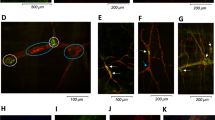Abstract
Background
Currently, indirect evidence suggests that the neurotransmitter nitric oxide (NO) plays a crucial role in the genesis of aboral propagation of esophageal peristalses during swallowing. However, direct evidence in this regard currently is lacking. This study aimed to assess the feasibility of using NO-selective microprobes to detect real-time NO changes within the esophageal wall of North American opossums (Didelphis virginiana) during normal progressive esophageal peristalsis and induced esophageal dysmotility.
Methods
Six adult opossums of both sexes (mean weight, 2.28 ± 0.41 kg) were included in the study. All had normal esophageal motility, as documented by water-perfused esophageal manometry. A calibrated carbon fiber NO-selective microelectrode (ISNOP30, ISNOP100) was placed within the smooth muscle portion of the esophageal wall, and changes in NO levels were measured as redox current in pico-amperes (pA) with the Apollo-4000 NO meter. The dynamics of NO in response to reflexive deglutition were assessed during both normal propagative peristalsis and abnormal esophageal contractions induced by intravenous (IV) administration of the neural NO synthase inhibitor L-nitro L-arginine methyl ester (L-NAME) and banding of the gastroesophageal junction (GEJ) for 4-weeks.
Results
During normal propagative esophageal peristalsis, a mean change of 2,158.85 ± 715.93 pA was measured by the NO meter. Intravenous administration of L-NAME and chronic banding of the GEJ induced achalasia-like esophageal contractions. A significantly smaller change in levels of NO was detected within the esophageal wall during dysfunctional motility (331.94 ± 188.17 pA; p < 0.001) than during normal propagative peristalsis (579 ± 385 pA; p < 0.001).
Conclusion
The results of this study indicate that carbon fiber NO-selective microprobes can successfully measure changes in the concentration of NO, an important inhibitory neurotransmitter, within the esophageal wall and that these preliminary data support the involvement of this crucial neurotransmitter in programming normal propagation of peristaltic waves within the esophagus.



Similar content being viewed by others
References
Dodds WJ, Christensen J, Dent J, Wood JD, Arndorfer RC (1978) Esophageal contractions induced by vagal stimulation in the opossum. Am J Physiol 235:E392–E401
Mukhopadhyay AK, Weisbrodt NW (1975) Neural organization of esophageal peristalsis: role of vagus nerve. Gastroenterology 68:444–447
Yamato S, Spechler SJ, Goyal RK (1992) Role of nitric oxide in esophageal peristalsis in the opossum. Gastroenterology 103:197–204
Anand N, Paterson WG (1994) Role of nitric oxide in esophageal peristalsis. Am J Physiol 266:G123–G131
Murray JA, Ledlow A, Launspach J, Evans D, Loveday M, Conklin JL (1995) The effects of recombinant human hemoglobin on esophageal motor functions in humans. Gastroenterology 109:1241–1248
Konturek JW, Thor P, Lukaszyk A, Gabryelewicz A, Konturek SJ, Domschke W (1997) Endogenous nitric oxide in the control of esophageal motility in humans. J Physiol Pharmacol 48:201–209
Iturriaga R, Villanueva S, Mosqueira M (2000) Dual effects of nitric oxide on cat carotid body chemoreception. J Appl Physiol 89:1005–1012
Simonsen U, Wadsworth RM, Buus NH, Mulvany MJ (1999) In vitro simultaneous measurements of relaxation and nitric oxide concentration in rat superior mesenteric artery. J Physiol 516(Pt 1):271–282
Levine DZ, Iacovitti M, Burns KD, Zhang X (2001) Real-time profiling of kidney tubular fluid nitric oxide concentrations in vivo. Am J Physiol Renal Physiol 281:F189–F194
Shibuki K (1990) An electrochemical microprobe for detecting nitric oxide release in brain tissue. Neurosci Res 9:69–76
Khajanchee YS, VanAndel R, Jobe BA, Barra MJ, Hansen PD, Swanstrom LL (2003) Electrical stimulation of the vagus nerve restores motility in an animal model of achalasia. J Gastrointest Surg 7:843–849
Gidda JS, Cobb BW, Goyal RK (1981) Modulation of esophageal peristalsis by vagal efferent stimulation in opossum. J Clin Invest 68:1411–1419
Richards WG, Sugarbaker DJ (1995) Neuronal control of esophageal function. Chest Surg Clin North Am 5:157–171
Park H, Conklin JL (1999) Neuromuscular control of esophageal peristalsis. Curr Gastroenterol Rep 1:186–197
Sifrim D, Janssens J, Vantrappen G (1992) A wave of inhibition precedes primary peristaltic contractions in the human esophagus. Gastroenterology 103:876–882
Christensen J, Arthur C, Conklin JL (1979) Some determinants of latency of off-response to electrical field stimulation in circular layer of smooth muscle of opossum esophagus. Gastroenterology 77:677–681
Gidda JS, Goyal RK (1985) Regional gradient of initial inhibition and refractoriness in esophageal smooth muscle. Gastroenterology 89:843–851
Murray J, Bates JN, Conklin JL (1994) Nerve-mediated nitric oxide production by opossum lower esophageal sphincter. Dig Dis Sci 39:1872–1876
Wiklund NP, Leone AM, Gustafsson LE, Moncada S (1993) Release of nitric oxide evoked by nerve stimulation in guinea-pig intestine. Neuroscience 53:607–611
Goligorsky MS, Tsukahara H, Magazine H, Andersen TT, Malik AB, Bahou WF (1994) Termination of endothelin signaling: role of nitric oxide. J Cell Physiol 158:485–494
Leone AM, Wiklund NP, Hokfelt T, Brundin L, Moncada S (1994) Release of nitric oxide by nerve stimulation in the human urogenital tract. Neuroreport 5:733–736
Levine DZ, Burns KD, Jaffey J, Iacovitti M (2004) Short-term modulation of distal tubule fluid nitric oxide in vivo by loop NaCl reabsorption. Kidney Int 65:184–189
Iversen HH, Celsing F, Leone AM, Gustafsson LE, Wiklund NP (1997) Nerve-induced release of nitric oxide in the rabbit gastrointestinal tract as measured by in vivo microdialysis. Br J Pharmacol 120:702–706
Author information
Authors and Affiliations
Corresponding author
Rights and permissions
About this article
Cite this article
Khajanchee, Y.S., Swanström, L.L. Real-time dynamics of nitric oxide shifts within the esophageal wall. Surg Endosc 23, 2273–2278 (2009). https://doi.org/10.1007/s00464-009-0361-2
Received:
Revised:
Accepted:
Published:
Issue Date:
DOI: https://doi.org/10.1007/s00464-009-0361-2



